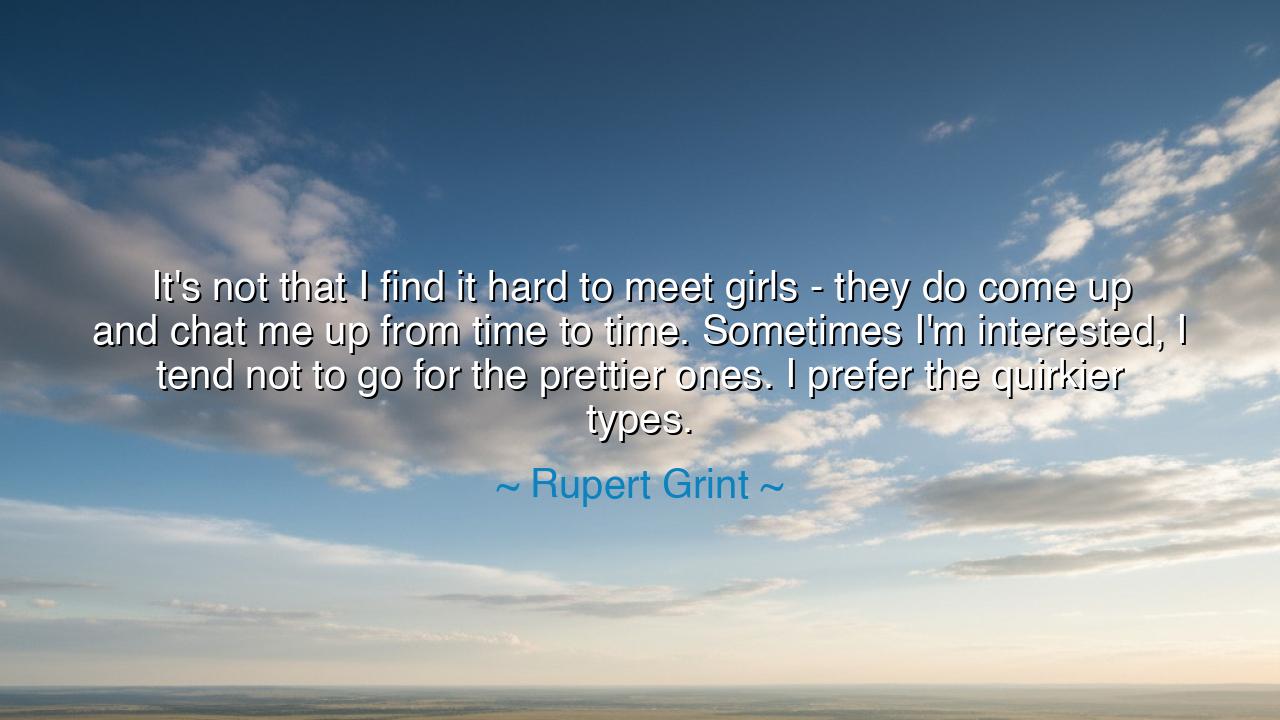
It's not that I find it hard to meet girls - they do come up and
It's not that I find it hard to meet girls - they do come up and chat me up from time to time. Sometimes I'm interested, I tend not to go for the prettier ones. I prefer the quirkier types.






When Rupert Grint confessed, “It's not that I find it hard to meet girls – they do come up and chat me up from time to time. Sometimes I'm interested, I tend not to go for the prettier ones. I prefer the quirkier types,” he revealed a wisdom that shines beyond youth or fame. Beneath his humble words lies an ancient truth about the nature of beauty, attraction, and the human soul. For in every age, the wise have known that what glitters is not always what endures, and that the light of a person’s spirit shines brighter than the polish of outward form.
To “prefer the quirkier types” is to see the divine spark of individuality — that strange and lovely imperfection which separates one soul from another. The pretty ones, radiant though they may be, reflect what the world already praises; but the quirky reveal what the world has yet to understand. In this, Rupert speaks as the artist does: drawn not to perfection, but to character, to the unpredictable beauty that blooms in authenticity. For true connection does not dwell in symmetry of face or body, but in the dance of spirits who recognize each other in their strangeness.
The ancients taught that even the gods favored uniqueness over perfection. Aphrodite, goddess of beauty, loved not the flawless but the passionate — those who dared to love boldly, even imperfectly. Socrates, famed for his wit yet mocked for his plainness, captured the heart of the beautiful Alcibiades not with his face, but with his mind. “He seemed ugly to look upon,” wrote Plato, “but within him was a golden soul.” So too does Rupert’s quote echo this ancient wisdom: that love guided by depth, by humor, by oddity, leads to the truer kind of joy — one born not of the eyes, but of understanding.
The quirky are the artists, the dreamers, the ones who tilt the world ever so slightly to show us a new angle of light. To love them is to love life in all its unpredictability. The pretty may charm the eyes, but the quirky awaken the heart. Their laughter comes not rehearsed but wild; their stories spill out like music unscored. The one who chooses them chooses surprise, growth, and genuine companionship over the dull perfection that fades with time. In this choice lies courage — the courage to see beyond surface and into essence.
Yet Grint’s words carry another, quieter truth: authenticity recognizes authenticity. The man who has lived amid fame’s illusions — who knows how easily beauty and attention can deceive — learns to crave the real. The one who has seen masks prefers the unmasked. Thus, his preference for the quirky is not rebellion but remembrance — a return to the simple truth that the soul, not the surface, defines the worth of a person. His words are a call for discernment in an age intoxicated by image.
Let us recall, too, that in all great love stories, it is not perfection that endures, but uniqueness. Antony loved Cleopatra not because she was the most beautiful woman in the world, but because she was unlike any other — unpredictable, brilliant, alive. Shakespeare’s lovers, flawed and impetuous, move us still because they were real, not ideal. It is the quirks — the laughter at the wrong time, the stubbornness, the fire — that make love human, and humanity divine.
Therefore, learn from Rupert’s quiet insight: seek not the most perfect, but the most true. When you look for beauty, look with your heart, not your eyes. Choose those whose spirit stirs your imagination, whose differences challenge and delight you. For in loving the quirky, you love life itself — the strange, the surprising, the deeply human. Let your relationships be not polished like marble, but alive like flame.
And so, remember this lesson, O listener: true beauty is the harmony of souls, not the symmetry of faces. Love the ones who make you think, laugh, and see the world anew. Cherish their oddities, for they are the fingerprints of the divine upon the heart. For when the years have dimmed the surface of all things, it is the quirky, the genuine, the deeply real — that will still shine.






AAdministratorAdministrator
Welcome, honored guests. Please leave a comment, we will respond soon